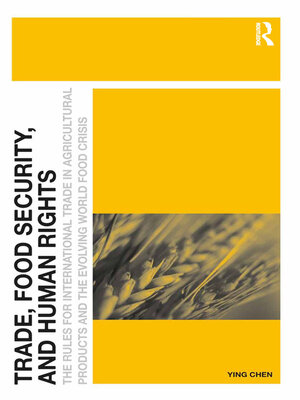Trade, Food Security, and Human Rights
ebook ∣ The Rules for International Trade in Agricultural Products and the Evolving World Food Crisis
By Ying Chen

Sign up to save your library
With an OverDrive account, you can save your favorite libraries for at-a-glance information about availability. Find out more about OverDrive accounts.
Find this title in Libby, the library reading app by OverDrive.



Search for a digital library with this title
Title found at these libraries:
| Loading... |
Most scholars attribute systemic causes of food insecurity to poverty, human overpopulation, lack of farmland, and expansion of biofuel programs. However, as Chen argues here, another significant factor has been overlooked. The current food insecurity is not absolute food shortage, since global food production still exceeds the need of the entire world population, but a problem of how to secure access to resources. Distorted agricultural trade undermines world food distribution, and uneven distribution impedes people's access to food, particularly in poor developing countries. Examining EU and US agricultural policies and World Trade Organization negotiations in agriculture, the author argues how they affect the international agricultural trade, claiming that current food insecurity is the result of inequitable food distribution and trade practices. The international trade regime is advised to reconcile trade rules with the consideration of food security issues. Several other enforceable solutions to reduce world hunger and malnutrition are also advanced, including national capacity building, the improvement of governance, and strategic development of biofuel programs. This book will be of great interest to agricultural trade professionals and consultant policy makers in the EU, US and developing countries. Students and researchers with a concentration on international trade, agriculture economics, global governance and international law will benefit greatly from this study.






